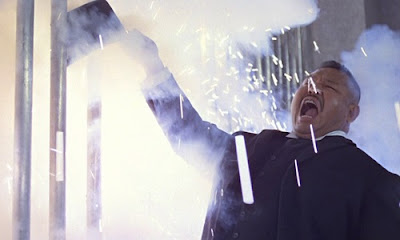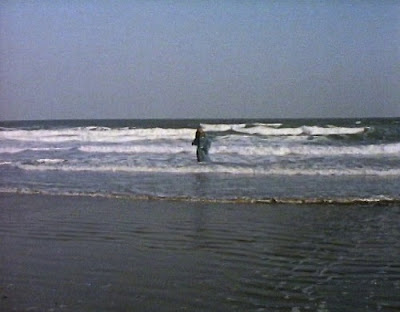Expensive Luxury Cat wanted to watch the Bond film with the most cats in it, but it turns out the film famous for Pussy Galore doesn't really have any cats in it at all!
It starts with a pre-titles sequence where Bond, in media res, comes out of the water with a duck on his head to fight some mannys and blow up some big red barrels of nitro. He proves how cool he is when he then sheds his wet disguise to be completely dry underneath.
Bond then goes back to his hotel to have another fight, which ends when he electrics his opponent and quips
"Shocking, poshitively shocking."
This film, the gold standard of Bond films (mew), starts as it means to go on with one of Bond's most iconic post-kill quips. Expensive Luxury Cat would like me to point out that the pre-titles sequence features a bomb and a manny getting electriced, both of which thematically parallel events at the ending of the film, with one of them getting repeated and the other averted.
This leads us into the title song - it may not be the best Bond song of all time, but is easily the most famous, although I prefer the alternative version by Ringo Starr.
The main plot begins at Miami Beach (thanks extremely convenient establishing flying sign) where Felix meets with Bond who is busy sexually harassing Dink, sending her off with a slap to her bottom. It's a good thing that Bond recognises Felix, because he's being played by a different actor from when we saw him in Dr. No so we wouldn't have known him otherwise. I presume that this is done deliberately to show us Felix is a spy and so is in disguise. Felix passes on orders from M for Bond to spy on Auric Goldfinger, along with a little exposition about the film's baddy.
Bond sneaks into "Mr Goldfinger's suite" at the hotel, where he catches Jill Masterson helping Goldfinger to cheat at cards for moneys, even though he is already a very rich manny. This is our first indication that he is petty in a Trumpesque way, indeed Goldfinger is one of the two main inspirations for the character of Donald Trump - the other being the leader of the Illinois Nazis from The Blues Brothers.
Bond seduces Jill and forces Goldfinger to start losing. When Felix telephones him, Bond says he's busy because
"Shomething big'sh come up."
(he's talking about his cock) but then Bond gets knocked out by a POV henchmanny, who we will later find out is Oddjob.
When he wakes up Bond sees that Jill has been gilded to death. You can tell that this is still early in the film series, as later on there's no way they wouldn't have missed the opportunity to call her Lily instead.
Bond goes back to M to be given his main mission for the film. M takes him to meet Sir Desmond Glazebrook (Richard Vernon) at the Bank of England, who gives Bond more exposition about Goldfinger. They suspect he is smuggling gold, but they don't know how - have they looked in his finger? Bond's mission is to find out how. To help him they give Bond a gold bar with which to tempt Goldfinger.
Bond also goes to see Q (Desmond Llewelyn) who gives him a car full of gadgets, all of which will get used over the course of the rest of the film.
"Ejector sheat, you're joking?""I never joke about my work, 007."
Q is quite right here, W-word is not a joking matter, mew.
Bond meets Goldfinger and his henchmanny Oddjob at a golf club where they play against each other. When Bond reveals he has the bar of gold, Goldfinger wants to get his paws on it, so he bets Bond that he will win their golf game and stakes the "cash equivalent" value of the gold bar against it. The gold bar is said to be worth £5,000, which is over £100,000 in today's moneys.
Goldfinger cheats, but Bond knows that he's cheating and so cheats better and wins. The golf game is only a small part of the film's gradual escalation of the dramatic conflict between Bond and Goldfinger, but it is great fun and is both my and Expensive Luxury Cat's favourite scene in the movie.
Goldfinger threatens Bond by having Oddjob show off his hat, slicing the head off a poor innocent statue. Bond asks
"What doesh the club shecretary have to shay?""Oh, nothing, Mr Bond. I own the club."
I find it particularly amusing that Bond's golf caddie W-words for the club and yet quickly sided with Bond, presumbaly because he would have had long experience of what a cunt Goldfinger is. This scene is also where Goldfinger has the maximum resemblance to Donald Trump.
Bond's real objective was to put a homing device into Golfinger's car, which he does successfully. This allows Bond to follow Goldfinger to Geneva. There Bond gets shot at by Tilly Masterson but she misses, so he uses one of his car's gadgets to wreck her car, then pretends it was an accident - not very convincingly given the damage done - and offers to take her to a garage. They are each suspicious of the other, but Bond drops her off and then gets on with his mission of following Goldfinger.
Bond stealths around Goldfinger's base until he sees Goldfinger showing Cato (Burt Kwouk) around. I suppose he must be here undercover on behalf of Inspector Clouseau, investigating Goldfinger on behalf of the Sûreté. Bond hears Goldfinger mention "Operation Grand Slam" at this point.
Tilly is also trying to stealth about the place and meets Bond. They set off the alarm and get chased back to his car. In the ensuing car chase Bond uses more of his gadgets to defeat some of their pursuers. Tilly tries to run away and gets killed by Oddjob's head-slicing hat, then Bond gets captured. He escapes briefly by ejecting the baddy who captured him from his car using the ejector seat, but he gets recaptured when Bond gets confused by a mirror, mistaiking it for another car. Take it from us cats, this is all too easily done.
Bond gets strapped to a table by Goldfinger and has an "industrial laser" pointed at him. Goldfinger says it can "punch a fist sized hole in six inch armour plate, or take the crystals from a snowflake one by one."
No, wait, that's wrong, he actually says it can "project a spot on the moon, or at closer range cut through solid metal."
"Do you expect me to talk?""No, Mr Bond, I expect you to die!"
In a series known for its many iconic moments, this is The Big One. The single most defining image of the James Bond series in public consciousness is Goldfinger about to use his laser to do a classic slow-cutting through James Bond's willy. Fortunately for him, Bond is able to bluff Goldfinger into thinking he is worth more alive as a prisoner than ded.
"Who are you?""My name is Pussy Galore.""I musht be dreaming."
It's not surprising that Bond should think this is a dream, since he's just seen Honor Blackman from The Avengers claiming to be a lot of cats.
Cathy Gale also undercover in this plot - is there any secret service that hasn't infiltrated Goldfinger's organisation by now? Pussy is Goldfinger's "personal pilot" and is flying Bond to the USA for the next stage in the plot. Bond tries to charm Pussy but she says she's "immune" which I suppose is because, at least for the moment, she only has eyes for John Steed.
Pussy paws Bond over to Oddjob who puts Bond in a cell. Felix detects Bond because of the homing device in his shoe, but he doesn't know he's been captured so all he can do for the moment is wait.
Goldfinger meets with a knuckle of gangsters to tell them all about "Operation Grand Slam," transforming his whole room into a giant presentation (PowerPoint not having been invented yet in 1964). Bond escapes from his cell by overpowering the single guard left to... er, guard him, in time to overhear most of Goldfinger's exposition. This is, in fact, the whole point of the presentation from a narrative point of view - for Bond to overhear it.
It certainly isn't for the gangster's benefit, because Goldfinger has them all killed after he's finished - this is a ridiculous and unnecessary plot hole, arising from the changes made to the film from the book, in which Goldfinger doesn't kill off any of the gangsters except for the one who refuses to be a part of the plan, Mr Solo (U.N.C.L.E. infiltrating the plot too? Except that Mr Solo is played by Martin "de Medici" Benson, not Robert Vaughn). Here in the film Goldfinger just has Mr Solo killed in a different way from the rest of the gangsters.
Bond is recaptured by Pussy and taken to see Goldfinger, just as Mr Solo is leaving. Bond slips the homing device into Mr Solo's pocket as he gets into a car to be driven away by Oddjob. Then Oddjob shoots Mr Solo and then has the car crushed. Lucklily for Oddjob there is another car there for him, so he doesn't have to walk home.
Crushing up the car also crushes the homing device, so Felix cannot follow it any more. He is forced to go back to Goldfinger's base and spy on it through binoculars until he sees that Bond is there. Bond is busy trying to persuade Goldfinger that his plan won't work and his gas "will kill shixty thoushand people usheleshly."
"Hah, American motorists kill that many every two years."
is Goldfinger's callous retort - Bond was forgetting that "he loves only gold."
The flaws Bond points out aren't flaws, as he sees when Goldfinger reveals he doesn't plan to steal the gold from Fort Knox. Bond then deduces the rest of the plan - to blow it up using an "atomic device."
The flaws Bond points out aren't flaws, as he sees when Goldfinger reveals he doesn't plan to steal the gold from Fort Knox. Bond then deduces the rest of the plan - to blow it up using an "atomic device."
"He'sh quite mad, you know."
and begins to win her over to his side. Unfortunately the way this then goes has not dated at all well since, never mind convincing her with reasonable arguments or an emotional appeal to her conscience, the way Bond wins Pussy over is that they have a fight until Bond forces a kiff on her that instantly converts her fully into siding with him.
The next scene sees Operation Grand Slam begin, and all the soldiers and other mannys around Fort Knox get gassed. Goldfinger's mannys then drive in, disguised as soldiers. Bond is with them, being guarded by Oddjob. They use the laser to do a classic slow-cutting through the front door. After that is done, Goldfinger himself arrives by helicopter, along with Burt Kwouk and the atomic device. Goldfinger and Oddjob take the bomb into the giant and very impressive Fort Knox set, where they handcuff Bond to it and plan to leave him behind to get blowed up along with all the gold.
The gassed mannys were only pretending, and now Felix and the soldiers wake up and counterattack. When they see the real soldiers attacking them, Goldfinger closes the vault and traps Oddjob and one of his other mannys in there too, before disguising himself as a soldier and shooting Burt Kwouk. This shows that Goldfinger had contingency plans and that, even with his main plan going awry, he has enough base cunning to try to save himself even at the expense of his erstwhile allies and henchmannys. That's right - the comparisons to Trump don't end with him cheating at golf.
Oddjob is loyal to Goldfinger to the end and willing to be blowed up, killing the other manny to stop him from disabling the bomb and then going to kill Bond for the same reason. They fight, and Oddjob is easily winning for most of it, but his downfall is caused by his determination to kill Bond using the head-slicing hat...
...which allows bond to electrick him. In both his role as iconic chief henchmanny to the main baddy and for his memorable death scene, Oddjob set the benchmark that few, if any, subsequent Bond henchmannys will be able to
With a countdown towards detonation that the great Terry Nation himself would have been proud of, Bond gets the lid off the bomb with 30 seconds to go, but he doesn't know how to defuse it. As the timer passes 10 seconds, he is about to try a desperate pulling out of all the wires when there is a sudden, cathartic comic moment - a random manny pushes Bond aside and deactivates the bomb by simply pressing the off switch.
Felix and the soldiers arrive just behind him, so this wasn't a total pollex ex machina. And as Felix and Bond meet up, it is finally revealed to the audience that Pussy changed sides secretly and swapped the deadly gas for harmless gas, which is why all the gassed mannys were only pretending to be killed.
In the next scene Felix sends Bond off in a plane to meet the president of the USA as a reward for saving Fort Knox, but instead of the president he meets Goldfinger, who comes in with a golden gun (shurely shome mishtaik - that's a different Bond film, isn't it?) looking very, very pissed off with Bond.
"I'm glad to have you aboard, Mr Bond."
he says, but this is clearly fake news. They fight and the golden gun goes off, depressurising the cabin so that Goldfinger gets "shucked into outer shpace" (as Bond foreshadowed back in the earlier scene when he was in the plane with Pussy). The plane crashes, but Bond and Pussy ejected in time and they end the film having kiffs underneath their parachute.
Naughty Bond.
Naughty Pussy.
Expensive Luxury Cat's rating: Very Expensive and Luxury































































